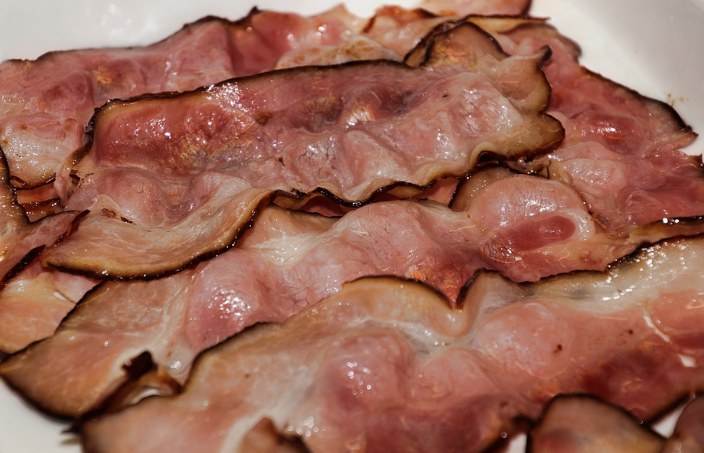
How to Tell If Bacon Is Bad – Easy Signs You Should Know
A staple in every home, Coleman Natural Hickory Smoked Uncured Bacon has a rich flavor and a crispy, satisfying texture. It comes as no surprise that it is frequently devoured a day or two after you bring it home from the store or have it delivered to your door.
However, occasionally your bacon might end up in the back of the refrigerator. Another possibility is that you buy a little bit more than your family can consume. You might soon be uncertain as to whether your bacon is still good or has gone bad.
Check The Expiration Date
Checking the expiration date on the package is one of the easiest and best ways to tell if bacon has gone bad. Bacon should be put in the refrigerator right away and kept there for no more than a week, according to the USDA. Checking the expiration date while you are at the store will save you time. And if you do forget, a quick check at home will enable you to decide whether you need to discard it. If you don’t intend to use the bacon right away, the USDA advises freezing it for up to four months.
Street Smart Kitchen does acknowledge that suggested sell-by dates, which are not necessarily expiration dates, are frequently written on meat labels. However, occasionally bacon that has passed its sell-by date is still edible. Look for black printed text and numbers when inspecting your bacon package. The typical sell-by date is displayed here. Fortunately, there are other ways to determine if your bacon is spoiled if eating it after the sell-by date makes you uneasy.
Four Signs Opened Bacon Has Gone Bad
The bacon won’t last indefinitely, even if you bought it fresh and stored it properly. Here are four indications that the bacon you kept in the refrigerator may have gone bad.
1. It Doesn’t Smell Quite Right
Bacon shouldn’t smell overly pungent. The smell should be somewhat smoky if anything.
Your bacon has spoiled if you encounter a sulfurous or sour smell. Bacteria, yeast, and fungi contaminate the bacon and cause it to smell. It’s possible for the microbes to release unpleasant odors on their own or by causing the bacon to do so.
These odors can occasionally be covered up by the smoky flavor of bacon. Therefore, if in doubt, be sure to check for additional indications that your bacon has reached the end of its shelf life.
2. It Feels Slimy
Fresh bacon ought to have a moist, soft feel. Something is wrong if you go to grab some bacon and it is slimy. It’s a common misconception that slime is simply water coming out of bacon. In reality, slime is the result of certain bacteria starting to decompose the meat.
Bacteria have almost certainly colonized your bacon if you notice that it feels slimy. To avoid putting yourself and your family at risk of becoming ill, you should therefore throw away your bacon.
3. It’s Discolored
White fat strips that are marbled with pinkish-red meat should be tantalizingly present in fresh bacon. The situation with a spoiled product isn’t always like this, though.
If your bacon has been in the fridge for a week, you might have noticed that it has a green, gray, or brown color. Once more, this discoloration is an indication that fungi or bacteria have colonized your bacon. You would be correct if you assumed that this indicated it was time to throw out the bacon.
4. It’s Moldy
Even though some fungi can grow on the surface of bacon, many bacteria, yeasts, and fungi are difficult to see with the unaided eye. Your bacon has unquestionably gone bad if you spot any mold or other growth on the item.
It is not advisable to cut off the moldy area of the bacon and cook the remaining pieces of bacon. There is a good chance that fungi may be present throughout the bacon even if you can’t see them if anything is clearly growing.

What Happens If You Eat Bad Bacon?
Eating raw bacon, or bacon that has gone bad can increase your risk of toxoplasmosis,
trichinosis, and tapeworms. Any type of raw or undercooked meat increases the risk of food poisoning because it contains bacteria, viruses, and parasites.
48 million Americans suffer from food poisoning each year, and rotten or raw meat is a major cause of this illness for many of these victims. It is best to make sure that the food you are cooking is fresh and free of any odd coloration, smells, or textures.
To reduce the likelihood of becoming ill, always store your bacon properly. If you consume bad bacon, you might experience symptoms like nausea, vomiting, diarrhea, fever, chest pain, and dehydration, which could ultimately necessitate hospitalization. Food poisoning from pork may appear suddenly or take weeks to manifest.
How Long Does Bacon Stay Fresh In The Refrigerator?
In the refrigerator, opened bacon will keep for roughly a week before going bad. Although unopened bacon can keep for up to two weeks in the refrigerator, ALWAYS check the package’s expiration date. The type of bacon and the method of processing will determine how long your bacon will stay fresh.
How To Preserve Bacon
Bacon can be stored in the refrigerator or freezer for varying amounts of time, depending on whether it has been opened or is still covered in its store packaging. Let’s go a step further so that, in theory, there should never be a chance that you will unintentionally consume bad bacon.
Keep your bacon in its packaging as long as you can once you get it home, of course. You’ll receive the best length of freshness as a result.
There are a few tips for keeping bacon fresh after you’ve opened the package, assuming you have any leftover that needs to be stored. By following these tips, you’ll have the best chance of using the bacon before it enters the Twilight Zone of Dubious Goodness.
Wrap your bacon in a kitchen towel to start. That will soak up any excess moisture that would otherwise serve as a haven for mold or bacteria.
Then, to reduce the amount of air it is exposed to, wrap or contain your bacon. This can be anything from plastic wrap, which will give you a seal that is reasonably tight, to aluminum foil, which is looser but still provides a physical barrier that is reasonably effective. But perhaps the two wisest choices are the ones that let you keep an eye on usage and dates.
There are two or three very helpful things you can do with bacon that has been stored in a reusable, sealable plastic food bag.
In order to reduce the amount of air inside the bag and the likelihood of bacterial growth, start by smoothing it out.
Another step you can take with this is to always vacuum seal the bag before putting any meat in the fridge or freezer if you have a vacuum sealer. Again, this reduces the risk of infection, increasing the likelihood that the bacon you eat the next time will be safe to consume.
Can You Freeze Bacon?
It’s also possible to freeze cooked bacon. Take bacon off the heat a little bit before it becomes crispy when cooking. Once completely cooled, place it on a paper towel to absorb any excess fat. It can then be frozen for up to three months.
To prevent freezer burn or contamination, remove as much air from the bags as you can. After opening, vacuum sealing can be used to create a tight seal and reduce air infiltration.
Be aware that storing bacon in the freezer can alter its flavor, encourage freezer burn, and cause fat to rancidify. After freezing, use it within two months to ensure the best flavor. These time zones may slightly vary based on the type of bacon you purchase.
Conclusion
Several people frequently enjoy the delicious protein that is bacon. Purchase premium pork belly to get the freshest bacon. If you want to learn how to make your own bacon, check out this post by the Grilling Dad.
Bacon needs to always be cooked thoroughly (sooner rather than later after purchase) and stored correctly at the appropriate temperature. You can tell whether you’re safe or need to buy a new pack by using your senses to make this judgment.





Average Rating